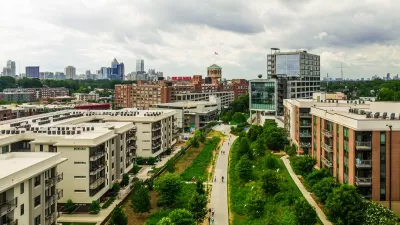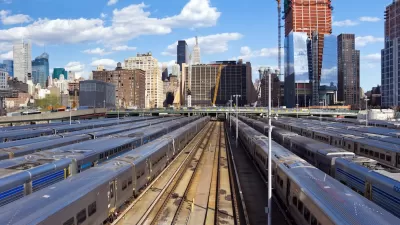Cities have to prioritize displacement as a policy issue if they want to achieve inclusive growth, writes David Whitehead.

As pro-growth and anti-gentrification advocates clash in cities across the U.S., Greater Greater Washington contributor David Whitehead suggests that one way to bridge the divide is by addressing the displacement caused by new development.
"The goals of redeveloping affordable homes, building more homes overall, and maintaining a clear path for original residents to return do not have to be at odds," he writes. If combined with tenant protections and preservation efforts, he argues, growth and redevelopment can be managed in a way that "does not pit the needs of our burgeoning population and the needs of more vulnerable residents against one another."
D.C.'s Comprehensive Plan—not uniquely—doesn't define any policy tools or funding mechanisms aimed at preventing displacement. To fill that gap, Whitehead lays out the principles behind a policy package proposed by the GGW team.
The package suggests new policy tools to preempt a few of the ways that new developments can directly cause displacement. Recommendations include requiring one-to-one replacement of affordable units in new developments, as well as build-first policies, in which existing apartments are not demolished until their replacements are ready. Funding proposals include:
…allowing zoning flexibility to build a taller building, using some of the profit generated from those extra units to subsidize in-house lower-cost units. That might mean expanding voucher programs like DC’s Low Rent Subsidy Program (LRSP), to help meet the gap between what families can afford and what it costs to build a low-cost home.
For more perspectives and debate on these ideas, look no further than the comments.
FULL STORY: DC’s Comprehensive Plan needs to treat displacement as a serious problem

Alabama: Trump Terminates Settlements for Black Communities Harmed By Raw Sewage
Trump deemed the landmark civil rights agreement “illegal DEI and environmental justice policy.”

Study: Maui’s Plan to Convert Vacation Rentals to Long-Term Housing Could Cause Nearly $1 Billion Economic Loss
The plan would reduce visitor accommodation by 25% resulting in 1,900 jobs lost.

Planetizen Federal Action Tracker
A weekly monitor of how Trump’s orders and actions are impacting planners and planning in America.

Grand Rapids Mayor Proposes Garage Conversion Plan
The mayor says allowing homeowners to convert garages to dwelling units could alleviate the city’s housing shortage.

Baltimore Ordered to Improve Sidewalk Accessibility
The city is one of many to face lawsuits for failing to comply with the Americans with Disabilities Act.

This Toronto Suburb Has More Bus Riders Than Columbus, Ohio
Brampton, Ontario used gradual improvements in service to prove that if you build it, they will ride.
Urban Design for Planners 1: Software Tools
This six-course series explores essential urban design concepts using open source software and equips planners with the tools they need to participate fully in the urban design process.
Planning for Universal Design
Learn the tools for implementing Universal Design in planning regulations.
Smith Gee Studio
Alamo Area Metropolitan Planning Organization
City of Santa Clarita
Institute for Housing and Urban Development Studies (IHS)
City of Grandview
Harvard GSD Executive Education
Toledo-Lucas County Plan Commissions
Salt Lake City
NYU Wagner Graduate School of Public Service





























